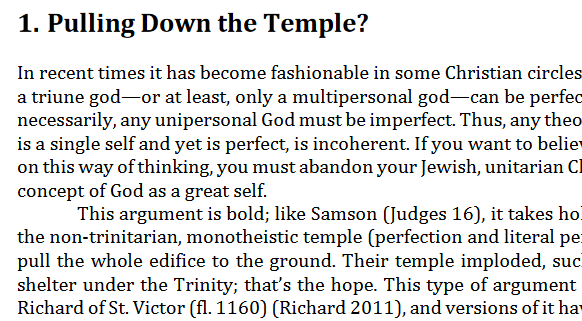
I neglected to share with you when my above-named paper was published in 2021: it is publicly available here. This was the result of several years of thinking about attempts to show that a God who is a single self must be imperfect. This is a point which Christian apologists have come to wield against unitarian Christian, Jewish, and Islamic theologies, and in some authors it is the first step in an attempt to show by reason alone that there must be exactly three divine selves. Most commonly, these arguments turn on the idea that a perfect being must be “perfectly loving” – although sometimes they start with other divine perfections, as I discuss.
I first presented an ancestor of this paper at a conference of the Evangelical Philosophical Society in 2018, which you can hear as podcast 230 – The Failure of Fashionable Antiunitarian Arguments. As you can hear from my interaction with Professor Swinburne there, I was having trouble understanding what his actual arguments are! After a few more years of rumination, correspondence with him, and looking at how he’d changed his arguments over the years in various books, and after finding Layman’s try, I was finally ready to share my thoughts. One referee for JAT was offended by some things I said in a draft, so I toned it down a bit.
The result is a pretty thorough, and I hope fair and convincing negative evaluation of this line of speculations. It’s a more complete treatment of the topic than I give here or here. If you’re a trinitarian, you ought to agree with everything I say in this paper, as nothing in it assumes a unitarian understanding of God, and as, in my view, nothing in my arguments there depends on any controversial speculations.
Fans of William Lane Craig and Richard Swinburne: beware of their speculations on why there can’t be a single divine self! They are refutable and are without any real basis in either Scripture or reason.
I’ll leave you with the abstract:
Some have argued that unipersonal concepts of God collapse into incoherence, so that such a being is no more possible than a square circle, or at least that such theologies are, as non-trinitarian, significantly less probable than some trinitarian theologies. I discuss the general strategy and examine recent arguments by William Lane Craig, C. Stephen Layman, Thomas V. Morris, and Richard Swinburne based on divine love, flourishing, and glory. I show why none of these arguments is compelling, as each has at least one weak premise.
Get the paper here.

It’s understandable to me why Trinitarians put so much weight on the attribute of God’s love in their efforts to prove that God is multi-personal. But to argue that an attribute must be demonstrated through some action in order for it to be the highest expression of that attribute doesn’t seem obvious to me. What happens when you switch attributes and apply that reasoning to, say, God’s holiness?
Is God essentially holy? It would certainly seem so. But if holiness means to be separated from (or set apart to) something, then how could God have been holy — in any way other than having that particular disposition — before He created anything? How could God have expressed His holiness prior to there being anything outside of Himself to be set apart *from* (or *to*)? I don’t know that anyone would argue that God has been eternally set apart from Himself (or to Himself). But if holiness is part of who He is, then is it illogical to think that God has always been perfectly holy in the sense of having the quality of character that would set Him apart from all else — once those beings were eventually created?
Good point, Paul.
Comments are closed.